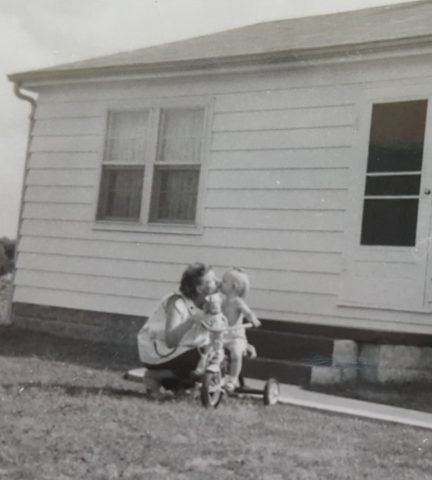There came the time when I realized I needed to help Mom consider moving from her home of over 50 years. I knew it would not be an easy ride with Hilde, a very independent German woman. But safety concerns and infrequent opportunities for social interaction helped me bring the possibility to light. My sales pitch? No more worries about leaks and other home repairs, which had become an obsession. And, as an incredibly social person, detailing activities and possibilities to mingle with others was the icing on the cake.
That was the easy part. More of a challenge? The move. Deciding what to keep. Memories. Yard sales. Furniture distribution. Disagreements. Changing minds. Strong opinions. Hurt feelings. Sigh…
The move was a stressful time for Mom and for her family. We could see it on her face and hear it in her voice. She was scared, worried, and overwhelmed. So were we.
“Transitional trauma” or “relocation stress syndrome” are very real diagnoses of the toll moving can take on older adults. Little or no planning, surrounded by boxes, worried about the future while tempering the emotions and concerns of family all combine to scare, worry and overwhelm the older adult.
Symptoms include exhaustion, sleep disturbances, anxiety, grief and loss, depression and disorientation. Existing health issues further compromise the anxious, older adult.
Are you or your friends involved in the move of parents or an older adult?
Here are some ways you can keep the stress of moving at bay:
- involve the older adult in the decision and planning processes; honor their preferences and allow them to maintain control
- be aware of details while helping to maintain the older adult’s routine
- keep track of personal possessions
- allow the older adult to help plan the living space
- help the older adult become comfortable and acclimated to their new living arrangement.
That said, many older adults aren’t involved in their moving process. Well-meaning family members often make the decisions and focus solely on details of the move, rather than on the needs of the person who is moving. Families who live across the country, or seem to function best while spending limited time together over the holidays are probably not best equipped to manage the move of an older adult.
Joy Brother, SRES, CRTS, is the Director of Move-In Resources and Resale for Lutheran Senior Services, based in St. Louis. Joy is a certified relocation and transition specialist. She and her team, as move-in professionals, are able to support the older adult and the family while maintaining a healthy relational distance. In fact, Joy says engaging the services of a move-in expert helps to buffer the emotional aspects of working with loved ones and reduces the stress of the process.
Joy recalls working an older adult, widowed for five years. Her life had not changed a lot since her husband’s death, as she continued to live in their home. Her family’s concerns of her living alone without support prompted them to suggest she move.
Her children, with only the best of intentions, took over the process of moving, thinking it would be easier for her. The stress of the situation wore down the woman as emotions among family members controlled the process. One day their mother, clearly exhausted and irritated, told them, “You don’t know what I want!”
Asked to step in to help, Joy worked with the woman, as the leader of her own move, and her children, as her caring support team. Joy helped the woman, as she decided what she really needed to keep and what there would be room for in her smaller home. She helped her identify furniture and other items she felt she could now part with. And, working with a professional tempered the emotion and stress, as the family team understood how to support their mother’s needs and wishes.
Months later, Joy saw the woman walking down a hallway at Meramec Bluffs, a community of Lutheran Senior Services. Joy hardly recognized her and said “you look amazing!” The woman cheerfully responded, “I am so happy! I love this place! No worries!”
Move-in specialists, such as Joy, work with older adults and their families to “rightsize” or downsize, and to assure the older adult will live comfortably in a safe, spacious and organized living space. They will share resources to help you help your parent or an older adult with their move.
Whether moving to a community of older adults, or a smaller home, “moving to a smaller space can expand your independence because it relieves you of all the stuff that ‘owns’ you,” says Mary Kay Buysse, executive director of the National Association of Senior Move Managers. “It frees you up both mentally and physically to enjoy life.”
Mom moved to an independent apartment she had chosen among those we visited. She loved it. No worries about home repairs. New and old friends around her. Trips to take and help with errands when she did not or no longer chose to drive. She was very happy. Mom didn’t say it but I knew she wished she had moved to her new home sooner. She occasionally reminisced about a couple of items sold at the yard sales that she felt were underpriced, but eventually realized talking about that black umbrella wasn’t going to bring it and other items back. Were there a next time, I would seek the help of a move-in specialist. Not to be. But helping Mom to move to a smaller home proved best for her at that point in her life.
You’ll find all kinds of resources to help you plan a move or connect with a move-in specialist online.
And boomers….WE ARE NEXT! Coming up!
(Special thanks to: Joy Brother, SRES, CRTS, Lutheran Senior Services, www.lssliving.org; Margit Novack, www.caring.com, “How to Alleviate the Stress of Moving for Older Adults;” Tina Gunn, www.aplaceformom.com/blog, “6 Benefits of Using a Senior Move Manager;” and Cari Shane, @cariinthecity, www.huffingtonpost.com, “A Moving Concern: Transitional Trauma.”)





